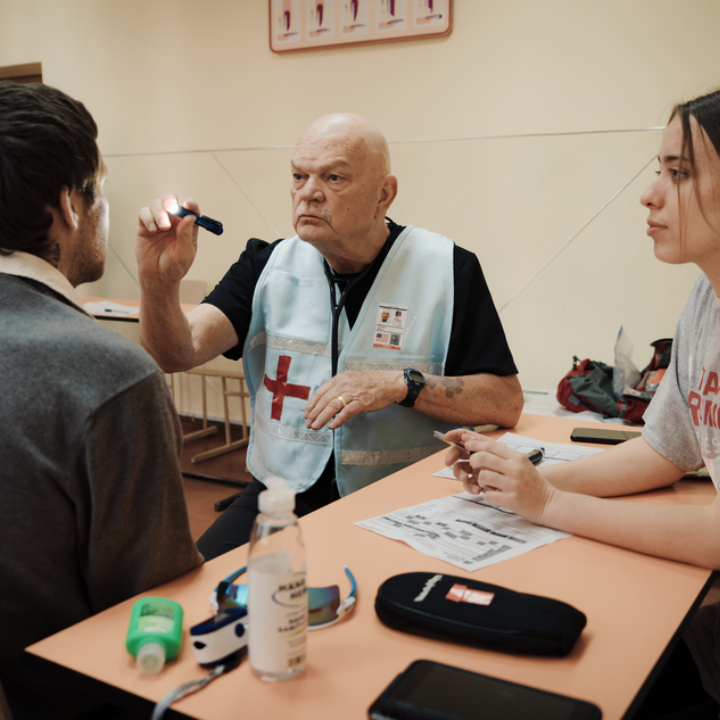
What Would You Bring?
NFLPA Chief Medical Director Dr. Thom Mayer recently spent nearly three weeks in Ukraine with a Team Rubicon mobile emergency team supported by the NFLPA. While there, they had the rare privilege of treating 350 displaced Ukrainians. Below, Dr. Mayer shares some of his observations from this unique experience:
Anyone not deeply and forever moved by the brave and tenacious people of Ukraine would be unworthy of calling themselves a part of the healing professions -- which on our clinical team included two emergency physicians, nurses, and firefighters each, as well as one physician assistant. The patients we met had been ripped out of their everyday lives, often witnessing the destruction of their homes and forced to escape 900 miles west out of the immediate war zone.
Faced with these jarring circumstances and left to choose only whatever you held most precious, what would you bring? Can you even imagine having to make such heart-rending choices?
We couldn’t. And yet we saw it in those 350 refugees, as they left behind the lives they spent decades building.
What would you bring?
What would you leave behind?
I can say with certainty what they did not leave behind -- their dignity, their courage and their commitment to stand firm for Ukraine – all with the hope to rebuild- their own lives and futures someday, somewhere. They were, without exception, straight-backed, resolute and deeply grateful for the care given them.
Here are a few of their stories.
- At a train station (where Russian missiles often targeted), we saw a 9-year-old boy with an acute respiratory infection. In Ukraine, a saying begins with “Slava Ukraini!” meaning “Glory to Ukraine.” After saying this to him, he shouted, proudly, “Eroaim Slava!” or “Glory to the Heroes!” Then he said something that made the interpreter begin to weep. “What did he say?” I asked. She turned to me and said, “He said, ‘Tell the American doctor not to worry about Ukraine. We will be fine!’” What this child brought was pure courage.
- At a Catholic retreat, a 73-year-old lady of great dignity came with ailments of hypertension, anxiety and mild heart failure. She chose to bring her husband, who had just had a lacunar stroke (with the common, yet satanic side effect of violent mood swings), as well as another cherished possession -- her cocoa toy chihuahua, Tyson. While we treated her physical ailments and later climbed five flights of stairs to evaluate her husband, I intuitively knew that her spirit was most in need of care, and I needed to make her laugh in the midst of her tragedy. So, I placed my stethoscope on Tyson’s tiny head and told her, through our interpreter, “Looks like this guy needs some psychotherapy!” Fortunately, this had the desired effect, demonstrating her amazing ability to laugh and retain hope, even in a crisis.
- During one of the incessant air raids, our patients came with us to the bomb shelter so we could continue evaluating and treating them in that eerily backlit setting. A 10-year-old girl had injured her knee while escaping from the city of Donetsk and needed a brace and anti-inflammatory medication. But she also needed to talk, as the sirens blared above us. Liane, our nurse from Duke University, taught her to take vital signs and I had her listen to her own heart, then mine -- after which she declared that she wanted to be a doctor “when this is all over.” She also said what she missed most was playing basketball. With her mother’s permission, we sent her picture to the Dean of the School of Medicine at Duke, as well as to the women’s basketball coach, asking them to be ready for a superstar in a few years. We helped her knee a little, but her spirit a lot. What she brought were her hopes and dreams.
- In a Catholic church converted to a shelter for Internally Displaced Persons (a horribly sterile term for these rich lives), we saw a proud lady of 87, who spoke French as well as Ukrainian, with multiple medical problems. She was so taken with our team that she kept cheerfully getting back in line to have us evaluate yet another concern. After helping her climb five floors to the housing area, her 35-year-old son returned to say, “Please help me. I don’t know what to do, but I think you will know. Should I stay and take care of my mother or join the army?” What would you say? I simply told him that his mother was a kind and brave person, and that people would undoubtedly take good care of her. But I also told him that while there are thousands of men volunteering to serve Ukraine, his mother only had one son. What he brought was his love for his mother and his country.
I wish you could have met the 350 souls for whom we did “house calls” and witnessed the kindness in their eyes, the wisdom in their smiles and their steely resolve to persevere. When you hear of the millions of such displaced people, torn from their lives when they should have been enjoying their homes, going to school and playing with their friends, please take a moment to reflect that each of them has a story which deserves to be heard as well as dreams which deserve to be fulfilled.
All of them need our support, and will for decades to come. Many people have shown their kindness by opening their pocketbooks. We had the great honor of opening our passports and being welcomed into Ukraine to care for them. I hope you won’t forget them. I know we never will, as the chilling, unfair predicament that they face continually replays in my mind
What would you bring?